五年级英语下册第一单元单词及重点句型汇总
人教版五年级英语下册重点句型及语法

人教版五年级英语下册重点句型及语法第一单元1、其他日常活动:eat breakfast 吃早饭 eat lunch吃午饭 eat dinner 吃晚饭get up起床 go to bed 上床睡觉 wash my clothes 洗我的衣服watch TV看电视 go swimming 去游泳 go running去跑步do homework 做作业 do kungfu练武术 play ping-pong打乒乓球play football踢足球 play basketball打篮球 play the pipa弹琵琶play music 演奏音乐 finish class 结束上课 start class 开始上课in the water/sea 在水里/在海里 is good at 擅长 get off 逃脱 lots of 许多2、频度副词。
always总是,一直(100%)usually通常(80%) often 经常(60%)sometimes(30%)有时3、疑问词。
when什么时候 why 为什么 what 什么重点句型。
1、询问别人什么时候做某事的句型及回答。
句型结构:问:When do you+动词短语原形+其他?(你/你们什么时候做某事?)答:I/we(+频度副词)+动词短语原形+at+具体时间(我/我们通常在几点做某事。
)例:问:When do you go to bed?(你什么时候上床睡觉?)答:I go to bed at 9:00p.m (我晚上9点上床睡觉。
)注意:当主语是第三人称单数(he,she,it,单个人名或单数名词)时,助动词do要变成doe s,句型结构是:when does+主语(第三人称单数)+动词短语原形+其他?2、询问别人周末做什么的句型及回答。
句型结构:问:What do you do on the weekend?(你周末做什么?)答:I(+频度副词)+动词(短语)+其他。
(完整版)人教版五年级英语下册Unit1知识点汇总

Unit1 My day 知识整理△话题:谈论每天的活动及时间安排△词汇:do morning exercises(做早操)eat breakfast/lunch/dinner(吃早餐/午餐/晚餐)have...class(上…课),play sports(做运动)clean my room(打扫我的房间),go for a walk (散步) go shopping(购物),take a dancing class(上舞蹈课)△拓展词汇:get up(起床), go to bed(上床睡觉)wash my clothes(洗我的衣服), watch TV(看电视)do homework(做作业), play music(演奏音乐)cook dinner(煮晚餐), at home(在家)in the morning(在上午),in the afternoon(在下午)in the evening(在晚上),at night(在半夜)△句型:①询问做某事在几点When do you+动词原形(短语)+其他?—— At +时间—— I(+频度副词)+动词原形(短语)+at+时间。
例句:When do you get up in the morning?—— At 7:30.—— I often get up at 7:30.②询问周末的活动安排What do you often do on the weekend?I often (always/sometime/usually) +…(周末的活动)+with … (某人)+on the weekend (on Saturdays/on Sundays ).例句:What do you do on the weekend ?I often take a dancing class with my friend on Sundays. △知识点:1:注意介词的搭配at +具体时间(几点)/night/home at 9 o ’clock in +国家/季节 in Spainon +星期 on the weekend/on Sundays with +人 with my father/mother/friend 2:表示时间频率词的区别always 表示总是,一直;usually 表示经常,通常;often 表示经常,常常;sometimes 表示有时,间或。
小学五年级下册英语单词及句型汇总(Unit 1)
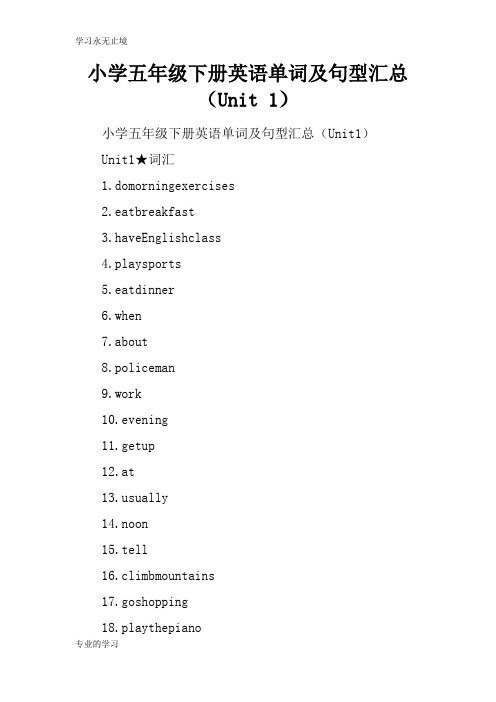
小学五年级下册英语单词及句型汇总(Unit 1)小学五年级下册英语单词及句型汇总(Unit1)Unit1★词汇1.domorningexercises2.eatbreakfast3.haveEnglishclass4.playsports5.eatdinner6.when7.about8.policeman9.work10.evening11.getup12.atually14.noon15.tell16.climbmountains17.goshopping18.playthepiano19.visitgrandparents20.gohiking21.weekend22.ofen23.sometimes24.rain25.either26.nextUnit1★重点句型1.whendoyougetup?你什么时候起床?2.whatdoyoudoontheweekend?周末你做什么?3.Thisismyweekendtimetable.这是我的周末日程表。
4.whendoyouplaysports?你何时进行体育活动?5.Tellusaboutyourday!告诉我们关于你的日子。
6.whichismike’stimetable?哪一个是迈克的日程表?7.Excuseme.canIaskyousomequestions?Sure.打扰一下,我可以问你一些问题吗?当然。
8.whatdoyoudo?你是做什么的?9.Iplaysportsatabout3:00intheafternoon.我在下午大约3点钟进行体育活动。
10.Thankyoufortellingmeaboutyourday.谢谢你告诉我关于你的日子。
11.Let’sgohikingtogethernextSunday.下个星期天让我们一起去远足吧。
12.SometimesIvisitmygrandparents.有时候我去看望我的祖父母。
五年级英语下册Unit1cinderella知识点及练习题新版译林

五年级英语下册Unit1 cinderella 知识点及练习题(新版译林)知识点1.Why?Because I can 't gaWhy 为什么回答用Because。
知识点2:clothes 衣服穿上衣服pul 重点单词:重点词组:在王子的家中2 不能去过来帮帮我4 如此的悲伤参加派对6 没有漂亮衣服和鞋子让我来帮你8 穿上新衣服回来10 在12 点之前玩的开心12 在聚会上不得不走14 你的鞋子拜访每一户家庭16 很多女孩试穿鞋子18 它不合适试穿它20 脱下你的外套21 试穿它们22 不得不睡觉23 穿上这件红裙子24 没有翅膀25 帮助灰姑娘26 不得不回来重点句型:王子的家中有一场舞会,但是灰姑娘不能去参加。
2 你为什么这么伤心?因为我不能参加舞会。
3 为什么你不能参加舞会?因为我没有漂亮的衣服和鞋子。
4 灰姑娘穿上了新衣服和鞋子。
她在舞会上玩得很开心。
5 许多女孩试穿了这只鞋,但是不合适。
根据课文内容填空Ta abut Cinderella . Becauvery . A fairy and . Cinderellalothes and . She aat the party. But she go o 'cluns fast andloses( 丢) her . Tany girlbut it . Finally, Cinderella 知识点1:can 的用法1) can 表示能力,意思是“能,会”。
后面直接跟动词原形,用于一切人称和数。
Can 的否定形式为can not ,其缩写为“ can't 。
如:We can speak much English now. 我们现在能说英语了。
2) 表示许可,意思是“可以”。
如:You can watch TV after supper. 晚饭后你可以看电视。
如:You can staax weeks. 你可以再待在这儿六个月。
【口袋书】人教版PEP五年级下册英语 基础知识汇总

人教版PEP五年级下册基础知识汇总Unit 1 My day.重点单词:[四会]dancing 跳舞;舞蹈exercise 活动;运动take 学习;上(课)[三会]after 在(时间)后start 开始usually 通常地;惯常地Spain 西班牙late 晚;迟a.m.午前;上午p.m.午后;下午why 为什么shop 去买东西;购物work 工作last 上一个的;刚过去的sound 听起来好像also 还;也busy 忙的need 需要play 戏剧;剧本letter 信live 居住island 岛always 总是;一直cave 山洞;洞穴win 获胜重点短语:eat breakfast 吃早饭have … class 上…课play sports 进行体育运动do morning exercises 做早操eat dinner 吃晚饭clean my room 打扫我的房间go for a walk 散步go shopping 去买东西;购物take a dancing class 上舞蹈课go swimming 去游泳start class 开始上课last night 昨天晚上after lunch 午饭以后a lot of fun 许多乐趣live on an island 住在一座岛上be good at sports 擅长体育运动字母组合cl 发/kl/ 音:clean 打扫clock 钟class 课;班级clever 聪明的clock 钟字母组合pl 发/pl/ 音:plate 盘子;碟子eggplant 茄子please 请play 玩耍;戏剧重点句型:1.询问别人什么时候做某事的问句及回答:-- When do/does + 主语+ 动词(短语)原形(+ 其他)?-- 主语(+ 频度副词)+ 动词(短语)原形/ 第三人稀单数形式+ at + 具体时间/ At + 具体时间.-- When do you get up? 你什么时候起床?-- I get up at 5 o'clock. 我5点起床。
五年级下册第一模块
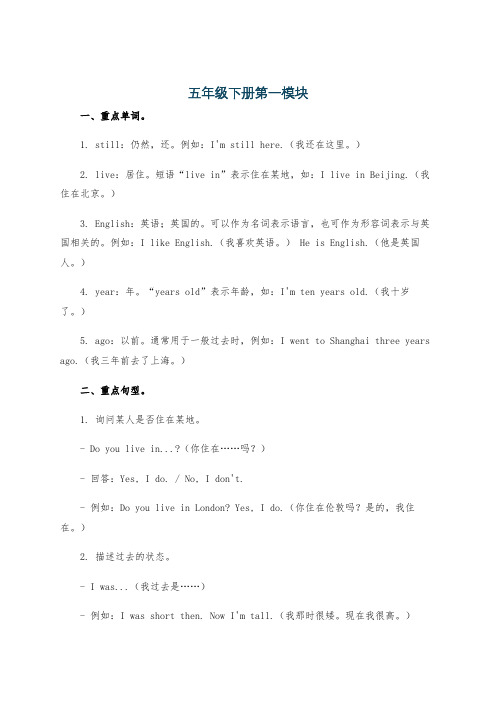
五年级下册第一模块一、重点单词。
1. still:仍然,还。
例如:I'm still here.(我还在这里。
)2. live:居住。
短语“live in”表示住在某地,如:I live in Beijing.(我住在北京。
)3. English:英语;英国的。
可以作为名词表示语言,也可作为形容词表示与英国相关的。
例如:I like English.(我喜欢英语。
) He is English.(他是英国人。
)4. year:年。
“years old”表示年龄,如:I'm ten years old.(我十岁了。
)5. ago:以前。
通常用于一般过去时,例如:I went to Shanghai three years ago.(我三年前去了上海。
)二、重点句型。
1. 询问某人是否住在某地。
- Do you live in...?(你住在……吗?)- 回答:Yes, I do. / No, I don't.- 例如:Do you live in London? Yes, I do.(你住在伦敦吗?是的,我住在。
)2. 描述过去的状态。
- I was...(我过去是……)- 例如:I was short then. Now I'm tall.(我那时很矮。
现在我很高。
)三、语法点。
1. 一般过去时。
- 概念:表示过去某个时间发生的动作或存在的状态。
- 动词形式:一般动词在词尾加 -ed,例如:live - lived,play - played。
但有一些不规则动词,如:am/is - was,are - were。
- 标志词:ago,yesterday,last...(last year去年,last week上周等)2. 一般现在时(用于描述现在的状态或经常发生的动作)- 在一般疑问句中,当主语是第一、二人称或复数时,借助动词do,动词用原形。
例如:Do you like apples?(你喜欢苹果吗?)。
外研版三起点五年级英语下册各模块复习重点
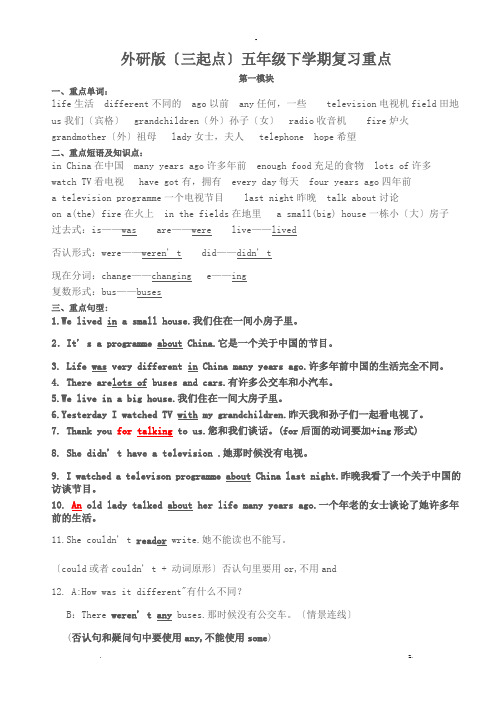
外研版〔三起点〕五年级下学期复习重点第一模块一、重点单词:life生活 different不同的 ago以前 any任何,一些 television电视机field田地us我们〔宾格〕 grandchildren〔外〕孙子〔女〕 radio收音机 fire炉火grandmother〔外〕祖母 lady女士,夫人 telephone hope希望二、重点短语及知识点:in China在中国 many years ago许多年前 enough food充足的食物 lots of许多watch TV看电视 have got有,拥有 every day每天 four years ago四年前a television programme一个电视节目 last night昨晚 talk about讨论on a(the) fire在火上 in the fields在地里 a small(big) house一栋小〔大〕房子过去式:is——was are——were live——lived否认形式:were——weren’t did——didn’t现在分词:change——changing e——ing复数形式:bus——buses三、重点句型:1.We lived in a small house.我们住在一间小房子里。
2.It’s a programme about China.它是一个关于中国的节目。
3. Life was very different in China many years ago.许多年前中国的生活完全不同。
4. There arelots of buses and cars.有许多公交车和小汽车。
5.We live in a big house.我们住在一间大房子里。
6.Yesterday I watched TV with my grandchildren.昨天我和孙子们一起看电视了。
五年级英语下册第一单元的单词
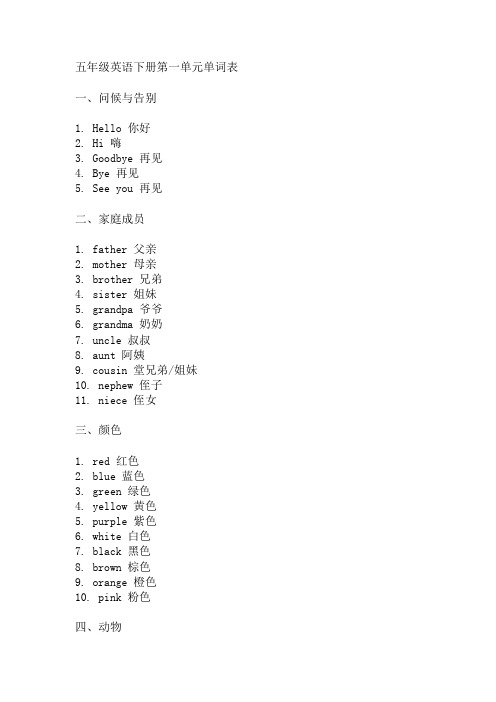
五年级英语下册第一单元单词表一、问候与告别1. Hello 你好2. Hi 嗨3. Goodbye 再见4. Bye 再见5. See you 再见二、家庭成员1. father 父亲2. mother 母亲3. brother 兄弟4. sister 姐妹5. grandpa 爷爷6. grandma 奶奶7. uncle 叔叔8. aunt 阿姨9. cousin 堂兄弟/姐妹10. nephew 侄子11. niece 侄女三、颜色1. red 红色2. blue 蓝色3. green 绿色4. yellow 黄色5. purple 紫色6. white 白色7. black 黑色8. brown 棕色9. orange 橙色10. pink 粉色四、动物1. cat 猫2. dog 狗3. bird 鸟4. elephant 大象5. tiger 老虎6. lion 狮子7. monkey 猴子8. panda 熊猫9. bear 熊10. rabbit 兔子11. horse 马12. sheep 绵羊13. cow 牛14. pig 猪15. frog 青蛙16. snake 蛇17. fish 鱼18. insect 昆虫19. butterfly 蝴蝶20. bee 蜜蜂21. spider 蜘蛛22. crab 螃蟹23. lobster 龙虾24. shark 鲨鱼25. whale 鲸鱼26. dolphin 海豚27. seal 海豹28. walrus 海象29. penguin 企鹅30. koala 考拉熊31. meerkat 猫鼬。
【知识学习】五年级英语下册第一单元单词及重点句型汇总

五年级英语下册第一单元单词及重点句型汇总Unit1wordList单词表cleanmyroom(打扫我的房间)domorningexercises(晨练)goforawalk(散步)eatbreakfast(吃早饭)takeadancingclass(上舞蹈课)goshopping(购物;买东西)haveEnglishclass(上英语课)eatdinner(吃晚饭)playsports(进行体育运动)when(什么时候)evening(夜晚;晚上)getup(起床)at(在……点钟)weekend(周末)always(总是,一直)often(经常)sometimes(有时候)usually(通常;一般)Unit1mainsentences主要句型.whendoyougetup?(你什么时候起床?)---Ioftengetupat7o’clock.(我经常在7点钟起床。
)2.whendoyoustartclassinSpain?(你在西班牙什么时候开始上课?)---Usuallyat9o’clock.(通常在9点钟。
)3.whatdoyoudoontheweekend?(你在周末做什么?)---IoftenwatchTVandplayping-pongwithmyfather.(我经常看电视,也常和我爸爸打乒乓球。
)4.Iusuallywashclothes.SometimesIcookdinner.(我经常洗衣服。
有时候我会做晚餐。
)5.Thatsoundslikealotoffun.(那样听起来很有趣。
)Unit1myday一、根据所给中文意思写单词。
______________________________________________________(打扫我的房间)(散步)(吃晚饭)______________________________________________________(上舞蹈课)(上英语课)(购物;买东西)______________________________________________________(吃早饭)(进行体育运动)(晨练)二、根据问句写答句。
五年级英语下册单词和重点句型

五年级英语下册单词和重点句型一、单词1.animal(动物)- a living creature such as a dog or cat that is not a human being例句:I love animals, especially dogs.2.cloud(云)- a white or grey mass in the sky, made up of very small floating drops of water例句:Look at the clouds in the sky, they are so beautiful.3.continue(继续)- to keep happening, existing, or doing something without stopping例句:The rain continued for several hours.4.exercise(锻炼)- physical activity that you do to make your body strong and healthy例句:I do exercises every morning to keep fit.5.fruit(水果)- something sweet that grows on a tree or bush and contains seeds or a stone covered by skin例句:I like to eat apples, oranges, and other fruits.6.island(岛屿)- a piece of land that is completely surrounded by water例句:We went to a beautiful island for our vacation.7.nature(自然)- everything in the physical world that is not controlled by humans, such as plants, animals, and natural events例句:I love spending time in nature, it helps me relax.8.picnic(野餐)- a meal that you have outside, often with friends, where you take food and drink with you例句:Let's have a picnic in the park this weekend.9.popular(受欢迎的)- liked by many people; frequently chosen or used例句:Harry Potter books are very popular among children.10.subject(科目)- an area of knowledge, especially one that you study at school, college, or university例句:My favorite subjects at school are English and Science.11.vegetable(蔬菜) - a plant or part of a plant that is eaten as food.例句:Eating vegetables is good for your health.12.mountain(山) - a large natural elevation of the earth's surface rising abruptly from the surrounding level; a large hill.例句:The mountains are covered with snow in winter.13.river(河) - a large natural stream of water flowing in a channel to the sea, a lake, or another river.例句:The river flows through the city.14.ocean(海洋) - a very large area of sea.例句:The ocean is full of mysteries.15.star(星星) - a celestial body that shines by its own light or byreflected light.例句:We can see many stars in the sky at night.16.moon(月亮) - the natural satellite of the earth.例句:The moon is full tonight.17.sun(太阳) - the star around which the earth and other planets revolve.例句:The sun is shining brightly.18.flower(花) - the reproductive structure of angiosperms, typically having brightly colored petals and a sweet fragrance.例句:The garden is full of beautiful flowers.19.book(书) - a written or printed work consisting of pages glued or sewn together along one side and bound in covers.例句:I love reading books.20.pen(钢笔) - an instrument for writing or drawing with ink.例句:I use a pen to write my diary.21.pencil(铅笔) - an instrument for writing or drawing made of a slender rod of graphite or a similar substance enclosed in a wooden casing.例句:I use a pencil to sketch.22.ruler(尺子) - an instrument for measuring or drawing straight lines.例句:I need a ruler to draw a straight line.23.eraser(橡皮) - an object used to remove pencil or ink marks from paper.例句:I can't find my eraser.24.backpack(背包) - a bag with shoulder straps, used to carry books andother items.例句:I carry my books in a backpack.25.desk(书桌) - a table, typically with drawers, at which one can read, write, or do other work.例句:My desk is messy.26.chair(椅子) - a seat with a back and legs, for one person.例句:I sit on a chair to study.27.classroom(教室) - a room in a school or college where classes are held.例句:The classroom is clean and tidy.28.teacher(老师) - a person who teaches, especially in a school.例句:My teacher is very kind.29.student(学生) - a person who is studying at a school or college.例句:I am a student.30.homework(家庭作业) - work that is assigned to students to be done outside of class.例句:I have a lot of homework to do.31.test(考试) - an examination of knowledge or skills, typically by means of questions and answers or practical exercises.例句:I am nervous about the test.32.grade(成绩) - a mark or score given for a piece of work or an examination. 例句:I got a good grade on my test.33.library(图书馆) - a building or room containing collections of books, periodicals, and sometimes films and recorded music for use or borrowing bythe public or a particular group.例句:I like to study in the library.34.bookstore(书店) - a shop that sells books.例句:I went to the bookstore to buy a new book.35.movie(电影) - a series of moving images, usually with sound, that tell a story.例句:I watched a movie last night.36.theater(剧院) - a building or outdoor area where plays and other dramatic performances are given.例句:We went to the theater to see a play.37.music(音乐) - an art form consisting of sound and silence, organized in time.例句:I love listening to music.38.instrument(乐器) - an object used to produce musical sounds.例句:He plays many instruments.39.singer(歌手) - a person who sings, especially professionally.例句:The singer has a beautiful voice.40.dance(舞蹈) - an art form consisting of movements of the body, usually in time to music.例句:She loves to dance.41.sport(运动) - an activity involving physical exertion and skill in which an individual or team competes against another or others.例句:I like to play sports.42.football(足球) - a game played by two teams of eleven players each, usinga round ball which players kick up and down the field in an attempt to score goals.例句:I play football with my friends.43.basketball(篮球) - a game played by two teams of five players each, usinga round ball which players try to throw through a hoop mounted on a backboard at each end of the court.例句:He is good at basketball.44.tennis(网球) - a game played by two or four players on a rectangular court, using a racket and a small, hollow rubber ball.例句:I play tennis on weekends.45.swimming(游泳) - the act of moving through water by using the arms and legs.例句:I go swimming every day.46.running(跑步) - the act of moving quickly on foot by alternately taking one foot off the ground and putting it down in front of the other.例句:I like running in the morning.47.cycling(骑自行车) - the act of riding a bicycle.例句:He goes cycling every weekend.48.hiking(徒步旅行) - the activity of going for long walks in the countryside.例句:We went hiking in the mountains.49.camping(露营) - the activity of spending a night or more outdoors in atent or other shelter.例句:I love camping in the summer.50.park(公园) - a public area of land set aside for recreation and enjoyment, usually with trees, grass, and flowers.例句:We went to the park to have a picnic.51.garden(花园) - a piece of land, usually near a house, used for growing flowers, vegetables, or other plants.例句:My grandmother has a beautiful garden.52.tree(树) - a large plant with a trunk, branches, and leaves.例句:There are many trees in the park.53.leaf(树叶) - a flattened structure growing from a stem or branch of a plant.例句:The leaves are turning red in autumn.54.flowerpot(花盆) - a container in which plants are grown.例句:I planted a flower in a flowerpot.55.bird(鸟) - a warm-blooded vertebrate animal that has feathers, wings, anda beak.例句:I saw a beautiful bird in the garden.56.fish(鱼) - a cold-blooded vertebrate animal that lives in water and has gills, fins, and a tail.例句:There are many fish in the river.57.insect(昆虫) - a small animal with six legs and a body divided into three parts.例句:I saw an interesting insect in the garden.58.butterfly(蝴蝶) - a flying insect with large, brightly colored wings.例句:The butterfly is very beautiful.59.bee(蜜蜂) - a flying insect that makes honey and pollinates flowers.例句:Bees are very busy.60.ant(蚂蚁) - a small insect that lives in colonies and is known for its hard work and organization.例句:Ants are very strong.61.house(房子) - a building for human habitation, usually consisting of a roof, walls, and floors.例句:I live in a big house.62.room(房间) - a part of a building enclosed by walls and a ceiling.例句:My room is very clean.63.kitchen(厨房) - a room or area where food is prepared and cooked.例句:My mother is cooking in the kitchen.64.bedroom(卧室) - a room where one sleeps.例句:I am sleeping in my bedroom.65.bathroom(浴室) - a room containing a bath or shower and often a toilet. 例句:I am taking a shower in the bathroom.66.living room(客厅) - a room in a house used for relaxing and entertaining guests.例句:We are watching TV in the living room.67.furniture(家具) - the movable articles that are used to make a room or building suitable for living or working.例句:We bought some new furniture for our house.68.table(桌子) - a piece of furniture with a flat top and one or more legs, used for eating, working, or playing games.例句:There is a vase on the table.69.chair(椅子) - a seat with a back and legs, for one person.例句:I am sitting on a chair.70.sofa(沙发) - a long, upholstered seat with a back and arms, for two or more people.例句:We are sitting on the sofa.71.bed(床) - a piece of furniture for sleeping or resting on.例句:I am lying on my bed.72.cupboard(橱柜) - a piece of furniture with shelves and doors, used for storing dishes, food, or other items.例句:There are many cups in the cupboard.73.drawer(抽屉) - a box-like compartment that slides in and out of a piece of furniture.例句:I keep my socks in a drawer.74.window(窗户) - an opening in a wall or roof to let in light and air.例句:The window is open.75.door(门) - a movable barrier used to close an opening in a wall or fence. 例句:I opened the door.76.floor(地板) - the surface of a room on which one stands or walks.例句:The floor is clean.77.ceiling(天花板) - the upper surface of a room, usually covered with plaster or other material.例句:The ceiling is high.78.wall(墙) - a vertical structure that divides or encloses an area.例句:The wall is painted white.79.color(颜色) - the visual perception of different wavelengths of light.例句:I like blue color.80.red(红色) - a bright color that is associated with heat, energy, and passion.例句:The rose is red.81.blue(蓝色) - a color that is associated with calmness, stability, and trust.例句:The sky is blue.82.green(绿色) - a color that is associated with nature, growth, and freshness.例句:The grass is green.83.yellow(黄色) - a bright color that is associated with sunshine, happiness, and optimism.例句:The sunflower is yellow.84.purple(紫色) - a color that is associated with royalty, luxury, and creativity.例句:The flower is purple.85.orange(橙色) - a bright color that is associated with energy, warmth, and enthusiasm.例句:The sunset is orange.86.white(白色) - a color that is associated with purity, innocence, and simplicity.例句:The snow is white.87.black(黑色) - a color that is associated with mystery, elegance, and power.例句:The cat is black.88.grey(灰色) - a color that is a mixture of black and white, and is associated with neutrality, balance, and stability.例句:The clouds are grey.89.brown(棕色) - a color that is associated with earth, stability, and reliability.例句:The bear is brown.90.pink(粉色) - a light red color that is associated with femininity, sweetness, and romance.例句:The dress is pink.91.clothes(衣服) - items of clothing.例句:I need to buy some new clothes.92.shirt(衬衫) - a garment for the upper body, typically with a collar, sleeves, and buttons down the front.例句:He is wearing a white shirt.93.pants(裤子) - an outer garment covering the body from the waist to the ankles.例句:I am wearing blue pants.94.skirt(裙子) - a garment for women or girls, hanging from the waist and usually reaching to the knees or ankles.例句:She is wearing a beautiful skirt.95.dress(连衣裙) - a one-piece garment for women or girls, typically with a skirt and bodice.例句:I bought a new dress.96.shoe(鞋子) - an outer covering for the foot, typically made of leather or other material.例句:I need to buy new shoes.97.sock(袜子) - a garment for the foot and lower leg, typically made of cotton or wool.例句:I am wearing white socks.98.hat(帽子) - a head covering.例句:He is wearing a black hat.99.gloves(手套) - a covering for the hand, typically with separate parts for each finger.例句:I am wearing gloves to keep my hands warm.100.coat(外套) - an outer garment, typically with sleeves and a fastening down the front.例句:I am wearing a warm coat.二、重点句型1. What's your favorite...?(你最喜欢的是什么…?)例句:What's your favorite color? - My favorite color is blue.这个句型用来询问对方最喜欢的事物,比如颜色、动物、食物等等。
五年级英语下册【单词、短语、句型】期末重点知识归纳

五年级英语下册【单词、短语、句型】期末重点知识归纳一、重点词汇。
eat breakfast吃早餐have···class上···课play sports进行体育运动exercise活动,运动do morning exercises早锻炼eat dinner吃晚饭clean my room打扫我的房间go for a walk散步go shopping去购物take学习,上(课)dancing舞蹈take a dancing class上舞蹈课a.m上午p.m.下午ually通常地二、其他日常活动。
get up起床eat lunch吃午饭go to bed上床睡觉wash my face洗脸wash my clothes洗我的衣服watch TV看电视play ping-pong打乒乓球play the pipa弹琵琶go swimming去游泳go running去跑步do homework做作业do kungfu练武术play football踢足球play basketball打篮球三、频度副词。
always总是,一直(100%)usually通常(80%)often经常(60%)sometimes(30%)有时四、疑问词。
when什么时候why为什么五、重点句型。
1、询问别人什么时候做某事的句型及回答。
句型结构:问:When do you+动词短语原形+其他?(你/你们什么时候做某事?)答:I/we(+频度副词)+动词短语原形+at+具体时间(我/我们通常在几点做某事。
)例:问:When do you go to bed?(你什么时候上床睡觉?)答:I go to bed at9:00p.m(我晚上9点上床睡觉。
)注意:当主语是第三人称单数(he,she,it,单个人名或单数名词)时,助动词do要变成does,句型结构是:when does+主语(第三人称单数)+动词短语原形+其他?2、询问别人周末做什么的句型及回答。
冀教版五年级英语下册第一单元知识点汇总
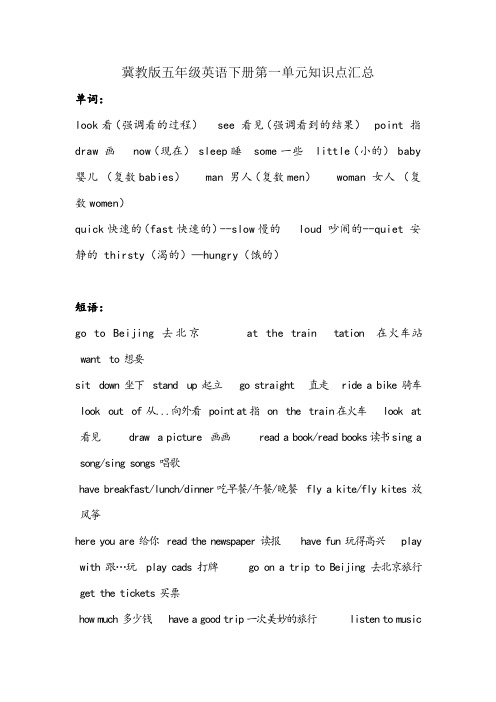
冀教版五年级英语下册第一单元知识点汇总单词:look看(强调看的过程) see 看见(强调看到的结果) point 指draw 画 now(现在) sleep睡 some一些 little(小的) baby 婴儿(复数babies) man 男人(复数men) woman 女人(复数women)quick快速的(fast快速的)--slow慢的 loud 吵闹的--quiet 安静的 thirsty(渴的)—hungry(饿的)短语:go to Beijing 去北京at the train tation 在火车站want to 想要sit down 坐下 stand up 起立 go straight 直走 ride a bike 骑车look out of 从...向外看point at指on the train在火车look at 看见draw a picture 画画read a book/read books读书sing a song/sing songs 唱歌have breakfast/lunch/dinner吃早餐/午餐/晚餐 fly a kite/fly kites 放风筝here you are 给你read the newspaper 读报have fun 玩得高兴play with 跟…玩 play cads 打牌 go on a trip to Beijing去北京旅行get the tickets 买票how much 多少钱have a good trip一次美妙的旅行listen to music听音乐句子:现在进行时表示现在正在发生的动作或事情时,(句子中出现look(看),listen (听)now(现在), 或者问题是What are you doing ?时要用到现在进行时。
)动词要在后面加上ingdraw(画)-drawing look(看)-looking point(指)- pointing see(看见)- seeing sleep(睡觉)- sleeping danc e(跳舞)- dancing hav e(有)- having writ e(写)–writing put(放置)- pu tt ing shop(购物)- sho pp ing swim(跳舞)- swi mm ing run(跑)- ru nn ing sit(坐)-si tt ing1.Please don‘t jump!不要跳Please don‘t point!不要指2.What are you doing ?你在干什么?I’m reading a book.我正在读书。
外研社版三起小学英语五年级下册期末Unit1-10重要知识点汇总整理

外研版(三起)五年级下册知识汇总Module 1一、单词still还,仍然 programme(电视或广播)节目lady女士,夫人life生活different 不同的ago以前interviewer采访者enough足够的television电视机grandchildren(grandchild的复数形式)(外)孙子;(外)孙女change改变,变化night夜晚,夜间work工作;劳动;干活儿field田地fire 火,炉火or(用于否定句中)也不,也没radio收音机telephone电话couldn't = could not不能write写hope希望二、短语1. many years ago 许多年前2. live in a small house 住在一所小房里3. enough food 足够的食品4. how about 怎么样5. lots of buses and cars许多公共汽车与小汽车6. every day 每天7. talk to 和......交谈8. miss China 想念中国 9. four years ago 四年前10. a television programme about China一个关于中国的电视节目11. last night 昨天晚上 12. talk about 谈论13. cook on a fire 在炉火上做饭14. work in the fields 在田地里劳作三、句型1. There weren’t many buses.2. There weren’t any televisions.3. We didn’t have enough food .4. Yesterday I watched TV with my grandchildren.5. An old lady talked about her life many years ago.四、语法—一般过去时 vs 一般现在时(一)一般过去时1. 含义:过去某个时间里发生的动作或状态。
五年级下册三年级起点英语书第一单元单词
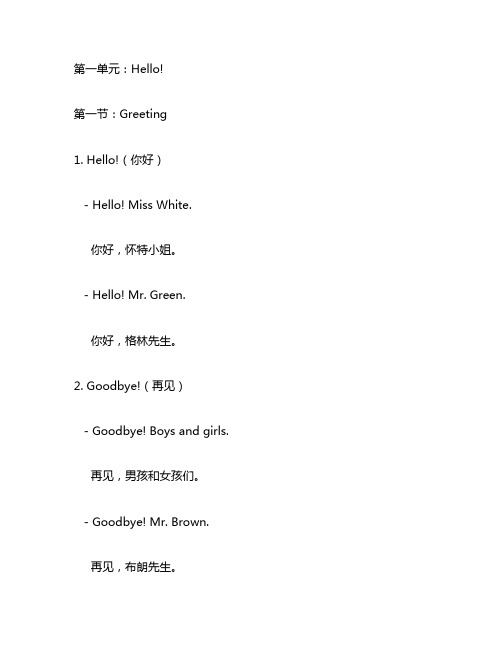
第一单元:Hello!第一节:Greeting1. Hello!(你好)- Hello! Miss White.你好,怀特小姐。
- Hello! Mr. Green.你好,格林先生。
2. Goodbye!(再见)- Goodbye! Boys and girls.再见,男孩和女孩们。
- Goodbye! Mr. Brown.再见,布朗先生。
3. Hi!(嗨)- Hi! Miss Black.嗨,布莱克小姐。
- Hi! Mrs. Smith.嗨,史密斯夫人。
第二节:Common phrases 1. How are you?(你好吗?) - How are you, Tom?汤姆,你好吗?- How are you, Mary?玛丽,你好吗?2. I'm fine, thank you.(我很好,谢谢) - How are you, Peter?你好吗,彼得?- I'm fine, thank you.我很好,谢谢。
3. What's your name?(你叫什么名字?) - What's your name, Lucy?露西,你叫什么名字?- My name is Lucy.我叫露西。
第三节:New words- teacher(老师)- classroom(教室)- student(学生)- desk(书桌)- ch本人r(椅子)- blackboard(黑板)- door(门)- window(窗户)- whiteboard(白板)- book(书)- pen(钢笔)- pencil(铅笔)- ruler(尺子)- bag(书包)- ball(球)- balloon(气球)- kite(风筝)- doll(玩具娃娃)- toy(玩具)第四节:ReviewLet’s review what we have learned in this unit.1. Greeting- Hello!- Goodbye!- Hi!2. Common phrases- How are you?- I'm fine, thank you.- What's your name? My name is…3. New words- teacher, classroom, student, desk, ch本人r, blackboard, door, window, whiteboard, book, pen, pencil, ruler, bag, ball, balloon, kite, doll, toy.Well done, boys and girls! See you next time! Goodbye!第五节:ConversationNow, let's practice some conversations using the new words and phrases we have learned.1. In the classroomA: Hello, Miss White.B: Hello, Lily. How are you today?A: I'm fine, thank you. What's your name?B: My name is Jack. Nice to meet you.A: Nice to meet you too.2. Getting ready for schoolA: Good morning, Mom.B: Good morning, Sarah. Are you ready for school? A: Yes, Mom. I have my bag, book, and pencil.B: That's great. Have a good day at school.A: Thank you, Mom. Goodbye!B: Goodbye, Sarah. Have a good day!3. Playing with friendsA: Hi, Tim. Do you want to play ball with me?B: Hi, Lisa. Yes, I'd love to play with you.A: Great! Let's go to the playground.B: Okay, let's go!This kind of practice helps students to build confidence and fluency when using the new words and phrases in real-life situations.第六节:Role PlayIn this section, we will do some role plays to help reinforce our understanding of the new words and phrases.1. Teacher and studentTeacher: Hello, class. Good morning.Students: Good morning, Miss White. Teacher: How are you today?Student 1: I'm fine, thank you.Student 2: I'm good, thanks.Teacher: What's your name, Peter?Peter: My name is Peter, Miss White.Teacher: Nice to meet you, Peter.Peter: Nice to meet you too, Miss White.2. At the classroomStudent 1: Please pass me the pen.Student 2: Here you go.Student 1: Thank you.Student 2: You're wee.3. PlaytimeChild 1: Hi, what's your name?Child 2: I'm Tom. What's your name?Child 1: I'm Sally. Do you want to play with the balloon?Child 2: Yes, I love balloons.Role play activities provide an interactive and engaging way for students to practice using the new vocabulary in different contexts.第七节:Listening and SpeakingIn this section, we will focus on improving our listening andspeaking skills through various activities.1. Listen and repeatStudents will listen to the teacher or recording and practice repeating the new words and phrases. This helps in correct pronunciation and intonation.2. P本人r workStudents will work in p本人rs to have short conversations using the new words and phrases learned. This promotes speaking and listening skills in a supportive environment.3. Picture descriptionStudents will describe a picture using the new vocabulary. This activity enhances speaking and listening skills, and also encourages creativity and storytelling.By incorporating listening and speaking activities, students can develop a deeper understanding of the new words and phrases and be more confident in using them in real-life situations.第八节:Writing PracticeNow, let's move on to some writing practice to reinforce the new words and phrases we have learned.1. Fill in the blanksStudents will be given sentences with missing words and will have to fill in the blanks with the appropriate new vocabulary.2. ShortpositionsStudents will be asked to write shortpositions using the new words and phrases. This encourages creativity and helps in consolidating the learning.3. DictationThe teacher will dictate sentences using the new vocabulary and students will have to write them down. This helps in spelling and reinforces memory of the new words and phrases.These writing practice activities 本人m to develop students' ability to use the new vocabulary in a written context and enhance their overall language skills.第九节:Review and AssessmentIt's time to review what we have learned in this unit and assess our understanding.1. Vocabulary quizStudents will participate in a quiz to test their knowledge of the new words and phrases learned in this unit.2. Oral assessmentStudents will have a one-on-one conversation with the teacher to demonstrate their understanding and usage of the new vocabulary.3. Written assessmentStudents willplete a written assessment including fill-in-the-blank exercises, shortpositions, and dictation to assess their writing skills and understanding of the new words and phrases.Through review and assessment, students can evaluate their progress and understanding of the new vocabulary, and teachers can identify areas for further support and development.ConclusionIn conclusion, the first unit of the Grade 3 English textbook has provided students with a foundation in simple greetings,mon phrases, and a range of new vocabulary. Through various activities such as conversation practice, role play, listening and speaking exercises, writing practice, and review and assessment, students have been able to engage with the new material in a meaningful and interactive manner. It is important for students to continue practicing and using the new words and phrases in order to build confidence and fluency in English languagemunication. By establishing a strong understanding of basic English vocabulary and language functions, students can progress to moreplex language skills and develop a solid foundation for future language learning. Good job, everyone! Keep up the great work!。
五年级英语下册重点知识归纳

五年级英语下册重点知识归纳重点知识归纳:五年级英语下册第一单元本单元的重点词汇包括:eat breakfast(吃早餐)、have class(上课)、play sports(进行体育运动)、exercise(活动、运动)、do morning exercises(早锻炼)、eat dinner(吃晚饭)、clean my room(打扫我的房间)、go for a walk(散步)、go shopping(去购物)、take(研究、上课)、dancing (舞蹈)、take a dancing class(上舞蹈课)、a.m.(上午)、p.m.(下午)和usually(通常地)。
除了以上词汇外,还有其他日常活动,如get up(起床)、eat lunch(吃午饭)、go to bed(上床睡觉)、wash my face(洗脸)、wash my clothes(洗我的衣服)、watch TV(看电视)、play ping-pong(打乒乓球)、play the pipa(弹琵琶)、go swimming(去游泳)、go running(去跑步)、do homework(做作业)和do kungfu(练武术)等。
在频度副词方面,有always(总是、一直,100%)、usually(通常,80%)、often(经常,60%)和sometimes(有时,30%)。
疑问词方面,重点是when(什么时候)和why(为什么)。
本单元的重点句型包括询问别人什么时候做某事的句型及回答和询问别人周末做什么的句型及回答。
对于第一种句型,问句结构为:When do you+动词短语原形+其他?回答结构为:I/we(+频度副词)+动词短语原形+at+具体时间。
需要注意的是,当主语是第三人称单数时,助动词do要变成does。
对于第二种句型,问句结构为:What do you do on the weekend?回答结构为:I(+频度副词)+动词(短语)+其他。
五年级下册英语第一单元整理归纳

精品文档五年级(下)Unit 11.单词:run 跑sorry 对不起,不好意思(道歉时用)jump 跳;跳跃sing 唱;演唱dance 跳舞sit 坐down 向下;朝下;沿着stand 站立;直立up 向上;在上面see 看见;明白;会见(过去式为saw)boy 男孩(复数boys)girl(复数girls) 女孩now 现在draw 画picture 图画;图片woman 女人(复数women) talk 交谈;讨论baby 婴儿(复数babies) cry 哭;哭泣;喊叫who 谁sleep 睡觉;入睡man 男人(复数men) hungry 饥饿的water 水tea茶(some tea 一些茶) candy 糖果(some candy一些糖果)train(火车)tree树(复数trees) window 窗户banana香蕉(复数bananas 一根香蕉a banana) dumpling饺子(通常使用的都是其复数形式dumplings)behind 在….之后tired 疲劳的,累的fruit水果(some fruit 一些水果) water 水(some water 一些水)swim游泳happy 高兴的sad 伤心的newspaper报纸paper纸card 卡片,纸牌(复数cards)find 发现,找到2.短语:go straight 直行turn left 左转turn right 右转ride a bike 骑自行车sit down坐下起立stand up站起来look at 看(某人或某物)look out of 从….向外看read the newspaper看报纸read a book /read books看书draw a picture /draw pictures 画画sing a song /sing songs 唱歌play football 踢足球play basketball 打篮球play ping-pong 打乒乓球play cards打扑克(with和…) watch TV看电视do my homework做作业have breakfast吃早餐have lunch吃午餐have dinner 吃晚餐take a picture / take pictures照相fly a kite / fly kites放风筝look out of the window 向窗户外面看wash my face 洗脸wash my hands 洗手make my bed 叠被子,整理床铺句子:3.祈使句:(祈使句是用来表达命令、请求、劝告、警告、禁止等的句子。
- 1、下载文档前请自行甄别文档内容的完整性,平台不提供额外的编辑、内容补充、找答案等附加服务。
- 2、"仅部分预览"的文档,不可在线预览部分如存在完整性等问题,可反馈申请退款(可完整预览的文档不适用该条件!)。
- 3、如文档侵犯您的权益,请联系客服反馈,我们会尽快为您处理(人工客服工作时间:9:00-18:30)。
五年级英语下册第一单元单词及重点句型汇总
Unit1wordList单词表
cleanmyroom(打扫我的房间)
domorningexercises(晨练)
goforawalk
(散步)
eatbreakfast(吃早饭)
takeadancingclass(上舞蹈课)
goshopping(购物;买xx)
haveEnglishclass(上英语课)
eatdinner(吃晚饭)
playsports(进行体育运动)
when(什么时候)
evening(夜晚;晚上)
getup(起床)
at(在……点钟)
weekend(周末)
always(总是,一直)
often(经常)
sometimes(有时候)
usually(通常;一般)
Unit1mainsentences主要句型
.whendoyougetup?(你什么时候起床?)
---Ioftengetupat7o’clock.(我经常在7点钟起床。
)
2.whendoyoustartclassinSpain?(你在西班牙什么时候开始上课?)
---Usuallyat9o’clock.(通常在9点钟。
)
3.whatdoyoudoontheweekend?(你在周末做什么?)---IoftenwatchTVandplayping-pongwithmyfather.(我经常看电视,也常和我爸爸打乒乓球。
)
4.Iusuallywashclothes.SometimesIcookdinner.(我经常洗衣服。
有时候我会做晚餐。
)
5.Thatsoundslikealotoffun.(那样听起来很有趣。
)Unit1myday
一、根据所给中文意思写单词。
__________________
__________________
__________________(打扫我的房间)
(散步)
(吃晚饭)
__________________
__________________
__________________(上舞蹈课)
(上英语课)
(购物;买xx)
__________________
__________________
__________________
(吃早饭)
(进行体育运动)
(晨练)
二、根据问句写答句。
.whendoyougetup?
___________________________________________(我经常在7点钟起床。
)
2.whatdoyoudoontheweekend?___________________________________________我经常看电视,也常和我爸爸打乒乓球。
)
3.whendoyoustartclassinSpain?
___________________________________________(通常在9点钟。
)
三、连词成句。
.lot,sounds,a,of,fun,that,like(.)
_____________________________________________________.
2.wash,I,sometimes,clothes,cook,I,usually,dinner(.)(.)
_____________________________________________________.。
